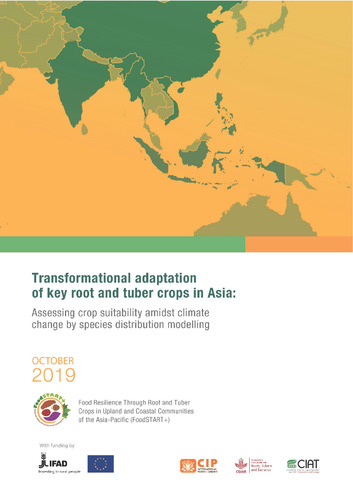Widespread negative impacts of climate change include limited plant growth, decreased soil fertility and ultimately limited food production. Roots, tubers and bananas (RTB) are key commodities for food security, nutrition and livelihoods especially among smallholder farmers. Furthermore, roots and tubers, being resilient crops, can help farmers adapt to climate change and variability. Nevertheless, food security and livelihood agenda mostly emphasize on grain crops (such as rice, maize, and wheat), and very few studies have looked into the future potential of RTB crops and their likely increasing importance in the face of climate change. This study attempts to identify areas in the Asia Pacific region where considerable climate impacts that threaten agricultural viability of major crops are expected. The study used climate projections and species distribution modeling approach for eight key crops in the region. In areas where impacts are very high, it is assumed that the currently cultivated crops may need to be substituted with more resilient crops.
Transformational adaptation of key root and tuber crops in Asia: Assessing crop suitability amidst climate change by species distribution modelling
Citation: Palao, L.K.; Naziri, D.; Balanza, J.G.; Campilan, D.M. 2019. Transformational adaptation of key root and tuber crops in Asia: Species distribution modelling for assessing crop suitability in response to climate change. Final Report. Food Resilience Through Root and Tuber Crops in Upland and Coastal Communities of the Asia‐Pacific (FOODSTART+) Project. Lima (Peru). International Potato Center. 34 p.
2019-10-11
CLIMATE CHANGE, CROP PROTECTION, NUTRITION,
ASIA, Oceania
report

